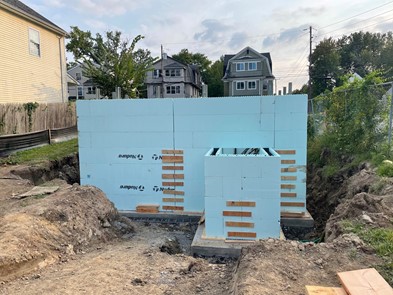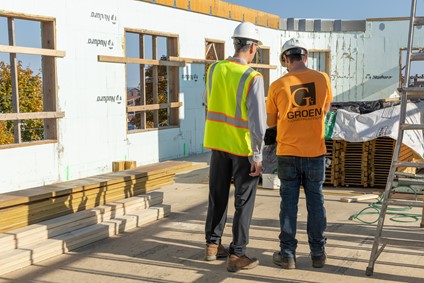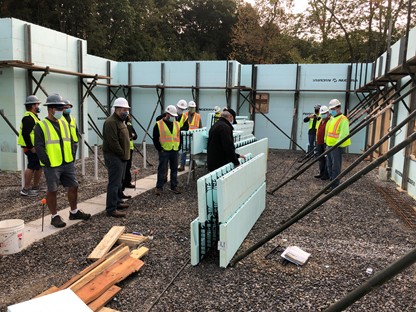
- Products
- Why Nudura
- Nudura Project Applications
- Training Academy
- Resources
- Company
So you’ve decided to build your next home. Wood framing, also known as stick built, is the leading method of home construction, so you’ll have architects, builders, and even employees at your local hardware store pushing you in that direction. But are you sure wood will have the strength to withstand all that your family and Mother Nature will throw at it? Have you considered any alternative building materials?
This blog post will empower you with information about Insulated Concrete Forms as an exterior wall option and the questions to ask your design/build team so you can make informed decisions and push for the elements you want in your home.
ICFs for Home-Building
Insulated concrete forms (ICFs) for basements and above-grade exterior walls outperform traditional construction methods, such as wood framing, in storm resiliency, energy efficiency, health and safety, and soundproofing.
Structures built with ICFs can be designed to withstand tornado and hurricane-force winds, debris impact, fire, and seismic movement. This durability in the face of an emergency confirms that an ICF house is the last home you’ll ever need to build.
With all of the advantages of ICF construction, the technology is still working its way to the forefront of people’s minds, including building and design professionals. There are countless success stories in residential and commercial construction, as well as thorough air, water, and impact testing, to prove the resilience and energy-savings of ICFs.
If parties try to stray you away from ICFs, ask them the following questions about their proposal:
- Will this method of construction withstand natural disasters?
- How will this save me money in the long run?
- Is it energy-efficient?
- Is there testing to support your claims?
- How much will it cost to build and maintain a FORTIFIED home with this approach versus ICF?
Compare these answers with data about insulated concrete forms and it is clear why ICFs are the preferred route for long-lasting, sustainable buildings.

The ICF Design and Construction Team
Now that you’ve decided, or are considering, to use ICFs in your home’s construction, you have the opportunity to bring together your design/build team who will carry your vision to reality. You may already have connections to some of these parties, so start there, ask for their recommendations of adjacent team members, and do your own online research. The timing or order of contacting these companies is less important as assembling the right team. Now let’s talk through the various groups you’ll need to ensure your project runs smoothly and results in your dream home.
Architects and Designers
As you plan the layout and final look of your home, your architect will assist you on the methods and materials to achieve it. When deciding on an architect, make sure the individual or firm keeps your goals as the top priority. If you notice them straying too far from your vision, you may have to tactfully guide them back. Alternatively, you may then want to consider a different architect partner.
ICFs can support the same layouts, silhouettes, and exterior and interior finishes as any other type of construction, so ICF-friendly architects can describe the design-possibilities and how ICFs will meet or exceed regional building and energy codes. If you are working with design professionals who are not familiar with ICFs, this introductory guide walks through the benefits of ICFs and the processes for designing with them.
And if you already have wood-frame construction drawings, as long as they haven’t broken ground yet, it is not too late to shift to an ICF build. The National Ready Mixed Concrete Association (NRMCA) offers free project assistance to help convert existing plans for wood and steel buildings to concrete through their Build With Strength Design Center.
From a manufacturer perspective, Nudura has a wealth of additional design and technical resources, but you can always contact your local Nudura representative directly for project-specific questions and insights.

Contractors, Builders, and Installers
Builders typically have connections with local distributors to discuss product options, acquire price quotes, and identify material turn-around times. They will also coordinate with the trades, such as plumbers and electricians, to ensure system compatibility and proper sequencing of work.
If you have talked to a residential contractor, they may or may not be familiar with insulated concrete form technology. Many builders still hold misconceptions about ICFs or are only comfortable using their usual methods of building, and may advise against it. As the customer, though, you have the power to fight for the home you want. The safety and long-term cost savings provided by ICF walls are unparalleled and should be prioritized in your build. Here are some questions to guide your installer vetting process.
There are numerous ICF installers who can assure you of the strength of ICFs and their ease of installation and will stand by you through the product selection and construction processes. Subcontractors who haven’t built with ICFs before can complete manufacturer-led installation training to get their crews up to speed. The training helps with not only erecting your home’s exterior walls but also the waterproofing and connectivity of the different building materials that come in contact with the ICFs. Definitely seek out installers who have received this instruction or have experience with ICF applications for added peace of mind.

Distributors
Distributors are the link between architects, installers, and building material manufacturers. They have relationships with all sides, so they can recommend ICF-friendly architects, connect you to a trained ICF builder, provide product comparisons, and quote materials.

Manufacturers
While your architect, installer or distributor may endorse a particular ICF product for your project, you as the homeowner can advocate for the manufacturer that best meets your needs. Here are some things you should look for:
- Products backed by performance testing
- Compatible systems for buildings connections to the ICFs, such as below-grade waterproofing, window and door bucking, flashing materials, etc.
- Comprehensive warranties
- On-site field services
- Additional resources, such as product calculators, custom home plans, and more.
Nudura offers online educational resources for guidance whenever you need it. And working through your distributor as a liaison, you can access our sales and technical experts for personalized support and even jobsite visits through the different construction phases to confirm proper ICF installation.
In terms of the products themselves, Nudura’s ICF forms, accessories, and waterproofing and cladding materials have been vigorously tested to ensure the maximum resiliency of your exterior walls with no air or water leaks for life of your building. Access our library of testing reports to learn more.
That's a Wrap!
It can be overwhelming to think about all the organizations who will be involved in the design and construction of your new home. While you can contact these groups in any order, if you’d like a partner to help navigate the complex process with you, Nudura is here for you at any stage of your project. We can introduce you to trained ICF architects, installers, and distributors while supporting you with design and building resources and in-person expertise. Contact your local Nudura representative here to get started on the path to your dream home.
CONTACT US
We’re committed to supporting homeowners and design professionals who are interested in or use our products. We’re always happy to help and provide more information.




